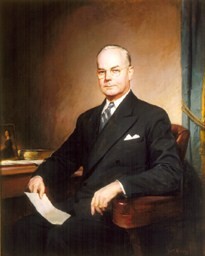John Wesley Snyder (US Cabinet Secretary)
| John W. Snyder | |
|---|---|

painted by Greta Kempton
|
|
| 54th United States Secretary of the Treasury | |
|
In office June 25, 1946 – January 20, 1953 |
|
| President | Harry S. Truman |
| Preceded by | Fred M. Vinson |
| Succeeded by | George M. Humphrey |
| Personal details | |
| Born |
John Wesley Snyder June 21, 1895 Jonesboro, Arkansas, U.S. |
| Died | October 8, 1985 (aged 90) Seabrook Island, South Carolina, U.S. |
| Resting place | Washington National Cathedral, Washington, D.C., U.S. |
| Political party | Democratic |
| Spouse(s) | Evlyn Cook Snyder (m. January 5, 1920 - d.) |
| Children | Edith Drucie Snyder |
| Alma mater | Vanderbilt University |
| Signature | |
John Wesley Snyder (June 21, 1895 – October 8, 1985) was an American businessman and senior federal government official. Thanks to a close personal friendship with President Harry S Truman, he became Secretary of the Treasury in the Truman administration. Historian Alonzo Hamby emphasizes Snyder's conservatism, stating that he was:
Snyder was born in Jonesboro, Arkansas, on June 21, 1895, to Jesse Hartwell Snyder and his wife Ellen (Hatcher). He studied at Vanderbilt University's engineering school for one year before serving in the Army during World War I.
Snyder moved to Washington in the early 1930s with a broad background in banking and business. He held several public and private offices including National Bank Receiver in the Office of the Comptroller of the Currency, Federal Loan Administrator, and Director of War Mobilization and Reconversion. In the last office he played a leading part in the transition of the American economy from a wartime to a peacetime basis. Liberals complained that he removed federal controls on the economy too quickly after the war, hurting consumers, delaying the housing program and bankrupting small businesses. His biographer says, "His handling of the steel crisis in 1946 was an even greater fiasco."
Snyder was appointed Secretary of the Treasury in 1946 by his close personal friend President Harry S. Truman, with whom he had served in the Army Reserves. Editorials criticized the cronyism and said his narrow range of experience made him unfit for the job. His task as Secretary was to establish a stable postwar economy. The main points of his program were maintaining confidence in the credit of the government, reducing the federal debt, keeping the interest rate low, and encouraging public thrift through investment in U.S. Savings Bonds. A deeply conservative businessman, he had faith that the free economy would work itself out. He reduced the national debt while balancing the budget. He was reluctant to spend large sums on the Marshall Plan of aid to Europe. Snyder had little diplomatic experience, and in his negotiations with British leadership regarding Britain's need for dollars, he angered his counterparts. Paul Nitze, an American negotiator, recalled a meeting in Washington in September 1949:
At another meeting his British counterpart, Chancellor of the Exchequer Hugh Gaitskell, concluded that Snyder was, "a pretty small minded, small town semi-isolationist.” Happily for the British Snyder was outmaneuvered by Secretary of State Dean Acheson, who was much more sympathetic.
...
Wikipedia
